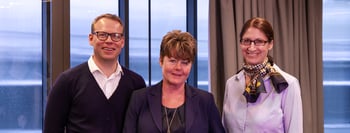What is the background to the customized Scania Evolution program?
The need has emerged over time. Scania has partnered with the Stockholm School of Economics Executive Education on skills development for managers in various formats for more than 40 years. The multi-year formats include, for example, the consortium training program “FEM – Executive Management Program” in which we collaborate with SSE Executive Education and a group of other large Swedish companies on the program’s format and content.
Given developments in society and new technical conditions, Scania has recently rolled out its “2025” strategic framework, providing direction for development towards a completely new transport system. Accordingly, it is particularly useful that we equip our managers with this type of strategic, executive education. The Scania Evolution program will play an important role in building a foundation and gaining a critical mass of managers able to drive development in the direction of the future we envisage.
We have modeled the Scania Evolution program on the FEM program – but turned it into a customized in-house program in which we can build on Scania’s view of figures and finances, apply our own language, and build networks and interaction between our managers, who bring their own specific challenges and insights to the table. With the participants sharing the same future, we believe that this format will make it easier for them to translate new learnings into their own reality. Coaching is planned to ensue, continuing the managers’ learning once the program has ended.
What is your view of Scania’s path towards the transport systems of the future?
The transport industry will need to change radically and, to be ready for this, we must first consider what we are doing today and secure “excellence in core”. We must ensure that we work sustainably and that what we do now generates conditions for favorable opportunities in the future. Simply holding on and staying the course presents numerous challenges. The greatest challenges for participants in the program involve things that occur in the day-to-day operations. So, how do we address the present while setting our sights on a different destination?
Senior management is aware that the new strategy could pull the organization in different directions, with some people feeling that they must prioritize their immediate challenges. Scania is performing so well that it may be difficult to accept that savings measures are already necessary. It is difficult to gain a clear view of the challenges. We also have considerable diversity in our management roles, which include everything from being responsible for a workshop to working directly on the strategies at headquarters. This entails naturally dispersed levels of insight internally. The Scania Evolution program will play an important part in bringing the organization back together.
“You can summarize our current view regarding management needs with a single concept – change management. This involves living with change and being able to lead change.”
Focusing on both present and future
The Scania Evolution program is management development at the upper-middle management level where a trial run with 21 participants has been conducted. The contents of the program are grouped into three modules.
In the first module, “Excellence in core”, we look at what we are doing really well today and what we need to continue doing well in the future. We need to understand where development is heading while also making money in the present so that we can invest and equip ourselves for this.
We call module two “Strategic bets”, in this part focusing on the future. Looking ahead, we see that we will be part of an ecosystem rather than part of a traditional value chain. What values will our stakeholders have in a scenario like this? What measures must we undertake to get there?
The third module, “Kill your darlings”, builds on discussions regarding what should be taken out. Are we doing things we should not do, or have we missed anything important?
External inspiration is highly important
In the program, we also bring in inspirational lecturers from outside the organization, including from Stora Enso and Epiroc, which have implemented major changes that we have the opportunity to hear about. And we make study visits – to Ericsson in Silicon Valley, for example.
Although this is an in-house program, we need to top up with inspiration from others. This is something we have learned from the consortium programs. Both from other similar, traditional companies like ours but also from other areas. For example, we have worked in a study visit to King, to see what challenges they face.
“Looking ahead, we believe greatly in inspiration being needed from a broad range of areas.”
If you only look inwards, thinking that we must do things ourselves, or if you look only to those who are very much like yourself, there is a risk of complacency in how to do things. Although this is one of the most conservative industries, things are now happening – we are seeing new levels of training, new needs from society, demands for sustainability and so forth, and we must be able to meet these.
We also need to be open to taking in skills and assistance from the outside. It can sometimes require too much effort and take too long to acquire skills internally. There is a risk that established habits will impede crucial development.
How are you working on strategies towards an increasingly uncertain future?
In an increasingly uncertain world, no one knows how to plan long-term – which is why Scania has chosen a 2025 strategy rather than a 2030 strategy. In such times, it is very difficult to answer the question of whether we should take a particular initiative or not. Both long and short-term thinking are required. We must chart a course ahead by means of long-term visions, while not locking ourselves in. Checks are needed along the way, with corrections being made if we see that we are on the wrong path.
“In strategic efforts, humility is needed. We must dare to reverse even if money and prestige have been invested in something. Moving forward, considerable strategy and courage must apply.”
All we know for certain is that much will change and that it will be as much a matter of fending off as of planning.
We need to be highly responsive to what is happening in society and among our customers. Transports that have previously occurred in a certain way will not occur in the same way in the future. There is also some uncertainty in the market with regard to partnerships and different roles in the ecosystem and it is necessary to understand and know how to present new developments without challenging the rest of the system, generating unnecessary uncertainty.
What do you want to achieve with the Scania Evolution program?
Participants in the program should become agents of change. They are to accelerate the shift and act as ambassadors for the new developments. And, with input from their new insights, we want them to dare to challenge their current approaches.
We have also received highly favorable reactions – hearing that the program was a “game changer” and about decisions made as a result of what they had learned. We believe that the opportunity to work with Scania’s own world as the foundation, with individual projects and with opportunities to reflect and share experiences with others who know the company from other angles, has been very good.
The program has really been an eye opener in both directions. Those of us working closely with the strategy have gained valuable insights in how to secure commitment out in the other parts of the organization – we may need to communicate differently and maintain a different pace. For the future, management has decided to focus more on securing commitment than was originally planned.
We then need to get even better at understanding the effects. Perhaps we should work with agility, taking measurements after briefer intervals to be able to make refinements along the way, including in our training projects.
On collaborating with SSE Executive Education
Both Mats and Ann have long-standing relationships with SSE Executive Education and have completed the “FEM program” themselves. Ann is also Scania’s representative in the steering committee.
We find SSE Executive Education to be both responsive and adaptive to the needs that arise. They are also flexible in their relations with other training partners.
Our long-term relations with SSE Executive Education have been good and, to date, they have never come into question. Everyone we are in contact with is knowledgeable, professional and easy to work with.
“Ultimately, of course, it is largely a matter of relations – being able to call if you need anything and being transparent when necessary."
Elisabeth Kamoun has worked with Scania for many years as responsible for SSE Executive Education’s consortium programs, and comments on the collaboration as follows:
“Scania is an amazing organization that works long-term and is very conscious about its personnel – they truly see all employees as the actual resource that constitutes the company’s success and contributes to it. We are proud to be a partner to Scania for such a long time and to support them with research and competence development for managers and leaders within the organization.”
Would you like to know more about how your organization can be developed through consortium programs or customized solutions?
Please contact us at +46 (0)8 586 175 00, programadvisors@exedsse.se or fill out the form to the right.


